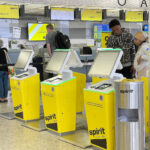The patient count in an outbreak of E. coli O157:H7 infections at a St. Louis County high school is approaching 100. St. Louis County Health officials reported on Nov. 19 there are 94 infected students from Rockwood Summit High School. When the outbreak was first reported on Nov. 14 there… Continue Reading Foodborne Illness Investigations, Foodborne Illness Outbreaks, E. coli, Rockwood Summit High School, St. Louis Food Safety News
The patient count in an outbreak of E. coli O157:H7 infections at a St. Louis County high school is approaching 100.
St. Louis County Health officials reported on Nov. 19 there are 94 infected students from Rockwood Summit High School. When the outbreak was first reported on Nov. 14 there were 14 patients.
The health department is investigating off-campus events as the probable source of the infections. One event was an end-of-season band banquet. Health officials have not reported what the other three events under investigation are.
The band event was hosted by Andre’s Banquets and Catering, but officials have not identified what exact food was contaminated. The business has been cooperating with the health department, but in interviews with local media the business operators have denied that their food was the source of the bacteria.
Health officials continue their investigation into the caterer.
“One thing I can say is it’s not a cafeteria-related event,” St. Louis County Health Director Kanika Cunningham said. “It was an off-site event, and we’re working with that particular entity and working with that location to identify the source.”
One mother has filed suit against the catering company in state court, according to St. Louis NPR. The suit, filed by Jennifer Cumbus, claims her child sought emergency care after eating at an event catered by Andre’s on Nov. 8. and developed symptoms two days later. The child “endured extreme pain, has been unable to eat, and has lost over seven pounds in the last week alone,” the suit claims. “She has been unable to keep food and water down due to nausea. (The child) remains severely fatigued, continues to experience severe pain, and her diarrhea continues to be bloody.”
Even though health department officials have said the school is not the source of the E. coli, school district officials have had the school cleaned and sanitized, with special attention to doorknobs and other high-touch items.
The school district and health department are asking that anyone who attended an off-campus event and become ill to contact the health department in addition to seeking medical attention.
About E. coli infections
Anyone who has attended any off-campus events where food was served and developed symptoms of E. coli infection should seek medical attention and tell their doctor about their possible exposure to the bacteria. Specific tests are required to diagnose the infections, which can mimic other illnesses.
Food contaminated with E. coli will not look, smell or taste spoiled.
The symptoms of E. coli infections vary for each person but often include severe stomach cramps and diarrhea, which is often bloody. Some patients may also have a fever. Most patients recover within five to seven days. Others can develop severe or life-threatening symptoms and complications, according to the Centers for Disease Control and Prevention (CDC).
About 5 to 10 percent of those diagnosed with E. coli infections develop a potentially life-threatening kidney failure complication, known as a hemolytic uremic syndrome (HUS). Symptoms of HUS include fever, abdominal pain, feeling very tired, decreased frequency of urination, small unexplained bruises or bleeding, and pallor.
Many people with HUS recover within a few weeks, but some suffer permanent injuries or death. This condition can occur among people of any age but is most common in children younger than five years old because of their immature immune systems, older adults because of deteriorating immune systems, and people with compromised immune systems such as cancer patients.
People who experience HUS symptoms should immediately seek emergency medical care. People with HUS will likely be hospitalized because the condition can cause other serious and ongoing problems such as hypertension, chronic kidney disease, brain damage, and neurologic problems.







